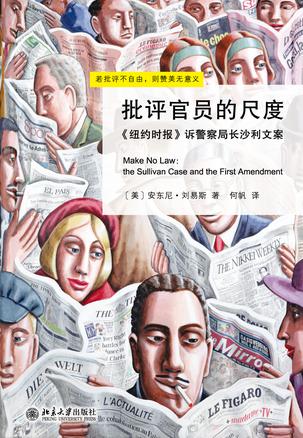《纽约时报》:为华尔街充当代言人的经济学家
《纽约时报》2013年12月28日头版长篇报道:
David Kocieniewski, Academics Who Defend Wall St. Reap Reward
刚刚有了官方中译文:为华尔街充当代言人的经济学家
《纽约时报》2013年12月28日头版长篇报道:
David Kocieniewski, Academics Who Defend Wall St. Reap Reward
刚刚有了官方中译文:为华尔街充当代言人的经济学家
 安东尼·刘易斯:
安东尼·刘易斯:
《批评官员的尺度:〈纽约时报〉诉警察局长沙利文案》
(Make No Law: The Sullivan Case and the First Amendment),
何帆译,
北京大学出版社2011年。
ISBN: 9787301188736
内容简介
1960年,因为一则批评性广告,警察局长沙利文以诽谤为由,将《纽约时报》告上法庭,并申请巨额赔偿。两审失利后,几乎被各地政府官员相继提起的索赔逼至绝境的《纽约时报》,奋起上诉至联邦最高法院。九位大法官在“《纽约时报》诉沙利文案”中力挽狂澜,宣布“对公共事务的讨论应当不受抑制、充满活力并广泛公开”,维护了媒体、公民批评官员的自由。《纽约时报》资深记者、两度普利策奖得主安东尼·刘易斯,以翔实史料、生动笔触,系统回顾了这起新闻自由史上的里程碑案件,并循此为线,串接起美国人民争取言论自由的司法抗争历史,完美展现了霍姆斯、布兰代斯、汉德、沃伦、布伦南、布莱克、韦克斯勒等伟大法官和律师的形象。

By DAVID SEGAL
IF there is ever a class in how to remain calm while trapped beneath $250,000 in loans, Michael Wallerstein ought to teach it.
Here he is, sitting one afternoon at a restaurant on the Upper East Side of Manhattan, a tall, sandy-haired, 27-year-old radiating a kind of surfer-dude serenity. His secret, if that’s the right word, is to pretty much ignore all the calls and letters that he receives every day from the dozen or so creditors now hounding him for cash.
“And I don’t open the e-mail alerts with my credit score,” he adds. “I can’t look at my credit score any more.”
Mr. Wallerstein, who can’t afford to pay down interest and thus watches the outstanding loan balance grow, is in roughly the same financial hell as people who bought more home than they could afford during the real estate boom. But creditors can’t foreclose on him because he didn’t spend the money on a house.
He spent it on a law degree. And from every angle, this now looks like a catastrophic investment.
Read the full article.

Choking on Growth: China’s Environmental Crisis
Part I. As China Roars, Pollution Reaches Deadly Extremes
Part II. Beneath Booming Cities, China’s Future Is Drying Up
Part III. In China, a Lake’s Champion Imperils Himself
Part IV. Chinese Dam Projects Criticized for Their Human Costs
Part V. Far From Beijing’s Reach, Officials Bend Energy Rules
Part VI. China’s Turtles, Emblems of a Crisis
Part VII. Trucks Power China’s Economy, at a Suffocating Cost
Part VIII. In China, Farming Fish in Toxic Waters
Part IX. China Grabs West’s Smoke-Spewing Factories
Part X. Beijing’s Olympic Quest: Turn Smoggy Sky Blue

By JOSEPH KAHN and JIM YARDLEY
The New York Times, Published: August 26, 2007

China’s industrial growth depends on coal, plentiful but polluting, from mines like this one in Shenmu, Shaanxi Province, behind a village store.

China’s cement factories, like this one in Ningxia Province, use 45 percent more power than the world average, and its steel makers use about 20 percent more.

China’s industrial growth depends on coal, plentiful but polluting, from coal mines like this one in Shaanxi Province behind a village store.
《纽约时报》英语报道原文
Audio Slide Show: The World’s Smokestack